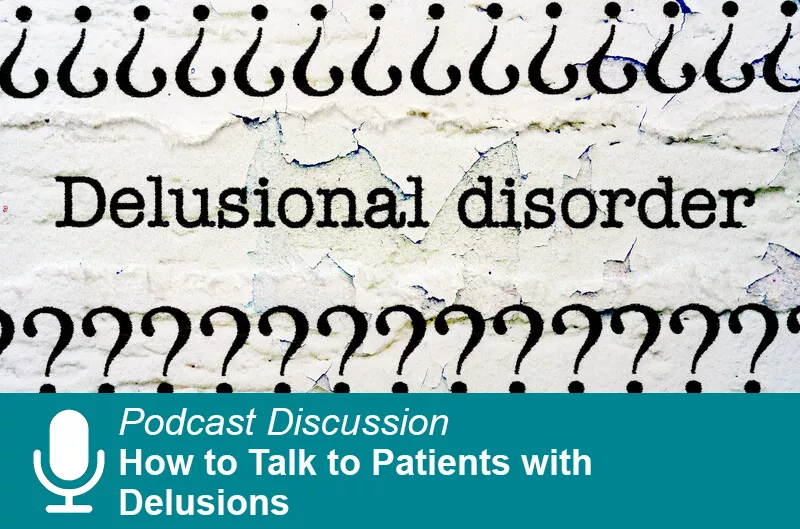Do antipsychotics treat all psychoses? And how do you talk to patients when they don’t work? Psychiatrist Michael Posternak shares his top tips. Plus: What the “Beads Task” tells us about the psychological underpinnings of delusional disorder.
Published On: 9/13/2020
Duration: 15 minutes, 47 seconds
Partial Transcript:
Kellie: The one thing in delusional disorder that patients don’t want to give up is the very thing that we’re trying to change. How do we even start the conversation?
With all that’s written about psychopharmacology in our field, it can seem like psychiatry is all about understanding medications, side effects, and drug interactions. But psychopharmacology is the easy part of our work. The greater challenge is connecting with people who think and feel very different from ourselves. In this month’s report we feature a review of delusional disorder. There are a few medication tips in there – like why pimozide is no longer first line – but overall we conclude that the evidence for antipsychotics is sorely lacking in delusional disorder.
Dr. Aiken: There are many types of psychosis – manic psychosis, depressive psychosis, drug-induced, dementia-related, medical-related, schizophrenia, schizotypal, and delusional disorder. Expecting all of these disorders to respond to the same medication would be like expecting every fever to respond to penicillin.
Delusional disorder can respond to antipsychotics, but the response is not as great as what we see in schizophrenia. Today we talk with psychiatrist Michael Posternak on how to help patients manage delusions that don’t resolve with medication.
Interview Answers These Questions:
- Michael you have a long standing interest in delusions. How did that start?
- What have you learned along the way about how to talk to patients with delusions?
- How do you support them without supporting their delusions?
- Do you get to work with the families in these cases?
- Yes it’s always possible that they could have delusional jealously and their spouse could still be cheating on them, but if the patient’s goal is to save their marriage the solution is usually to stop badgering and tracking their spouse.
- I imagine the patient would not want to get rid of the delusion, because then they would be dupped, fooled, and easily taken advantage of by their persecutors.
- To clarify, antipsychotics are effective in delusions due to schizophrenia, mania, or depression…. When you said they are not necessary and aren’t very effective you’re speaking of delusional disorder right?
- Any other tips you have?
Kellie: Michael Posternak is a psychiatrist in private practice in Boston Massachusetts. His research, which includes over 50 peer reviewed publications, has advanced our understanding of antidepressant therapy, and he is regular contributor to the Carlat Report. And now for the word of the day….the Beads Task
Dr. Aiken: The Beads Task was the first study to suggest that delusional disorder is about something more than just false beliefs. It’s a different way of thinking and processing information.
In a now classic study, the “beads task”1 was adapted to examine the relationship between delusions and data-gathering.2 Participants were shown 2 jars of beads, a mostly pink jar (85 pink beads; 15 green beads) and a mostly green jar (85 green beads; 15 pink beads). The jars were then hidden and participants were shown a sequence of beads apparently being drawn from 1 of the 2 jars (the sequence was actually prespecified by the experimenter). After each draw, participants were asked if they were ready to make a decision about which jar the beads were being drawn from or if they would like to see another bead. This study found that people with delusions made a decision about which jar the beads were being drawn from on the basis of significantly fewer beads than controls.
hey are willing to accept hypotheses on the basis of less evidence
Feedback? Take the podcast survey.


_-The-Breakthrough-Antipsychotic-That-Could-Change-Everything.webp?t=1729528747)



